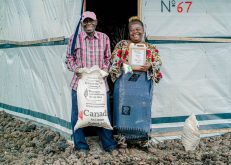The European Union is concerned by the trend of foreign investors and countries acquiring large tracts of farmland in developing countries to guarantee their own food security, a senior EU official said June 3.
Although the EU had not reached a common position on the issue there were fears the trend might pose a risk to developing countries if it were not done properly, said Stefano Manservisi, director general for aid and development at the European Commission – the EU executive.
Manservisi said his concerns did not mean such deals were bad, he said in an interview. But some were the result of negotiations that were very often untransparent, he added.
Read Also

ATP Nutrition wins agronomy innovation award at Ag in Motion 2025
Manitoba’s ATP Nutrition wins Ag in Motion 2025 Innovation in Agriculture Award for agronomy for its Synergro G3 biostimulant.
“The poorest countries are selling commodities, they are exporting migrants and now they are selling their land from which they will not take any kind of benefit in terms of food or whatever,” Manservisi added.
Countries such as Saudi Arabia, Abu Dhabi, the United Arab Emirates, China and South Korea are looking to buy farmland beyond their borders after sharp food price hikes in 2008 highlighted a need for greater food security.
Underexploited farmlands across Africa are particularly coveted by foreign investors, in a phenomenon known as “land grabbing.”
In March, Madagascar’s army-backed leader cancelled a deal by South Korea’s Daewoo Logistics to lease a million hectares of Madagascar to grow food.
A report in May, co-authored by international agencies estimated that nearly 6.2 million acres of farmland in five sub-Saharan African countries has been bought or leased since 2004: an investment of $919.98 million.


















